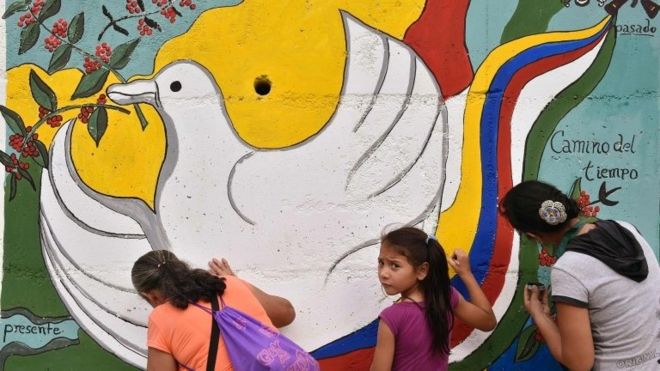Colombia Farc rebels announce definitive ceasefire
- 18 minutes ago
- Latin America & Caribbean
 AFP
AFP
The main leftist rebel group in Colombia, the Farc, has ordered all its fighters to observe a ceasefire from midnight local time (05:00 GMT Monday).
The ceasefire brings to an end the group's 52-year-old war, one of the world's longest insurgencies, after four years of peace talks in Cuba.
The final peace agreement will be signed in the next few weeks.
Farc leader Rodrigo Londono, known as Timoleon Jimenez or Timochenko, gave the order to stop firing.
"I order all our commanders and units and each one of our combatants to definitively cease fire and hostilities against the Colombian state from midnight tonight," Timochenko told reporters.
 PA
PA- Who are the Farc?
- Inside a Farc camp
- Timeline of the conflict
- Guerrilla leader who talks peace
- The Norwegian who helped broker peace
Colombian President Juan Manuel Santos signed a decree earlier to halt military operations against the Farc, also from midnight.
"The end of the conflict has arrived!" he said in a tweet on Friday.
Crucial milestone: Analysis by Will Grant, BBC News, Havana
 REUTERS
REUTERS
In one sense, the Farc's announcement of a total ceasefire is purely procedural. In another, it is a historic moment towards a lasting peace. It is procedural in that the bilateral ceasefire had already been agreed and there has in effect been a truce on the ground for several months.
But the definitive ceasefire was supposed to come into force the day after the final peace agreement was signed by President Santos and the leader of the Farc, Timoleon Jimenez - an event expected in Cartagena at the end of September. This moves that forward in a gesture of goodwill on both sides.
It is historic in that - finally - it brings to an end more than 50 years of conflict which left an estimated 260,000 people dead and millions internally displaced. These milestones are crucial for the Colombian peace process.
Perhaps more important is what comes next: a referendum on the agreement in early October. That will decide the fate of the years of negotiation in Havana and, in the process, the political futures of both President Santos and the Farc.
A peace agreement was announced on Wednesday in Havana, at the peace talks.
Farc fighters will ratify the accord in September and a Colombian referendum on the agreement will follow on 2 October.
Under the terms of the agreement, the Farc (the Spanish acronym for the Revolutionary Armed Forces of Colombia) will give up its armed struggle and join the legal political process.
The longest-running conflict in South America has killed an estimated 260,000 people and displaced millions.
Source: BBC News
Source: BBC News



Comments
Post a Comment